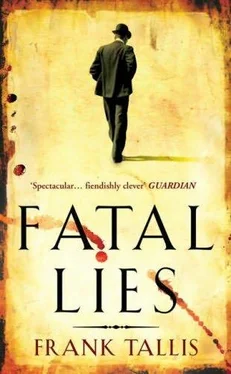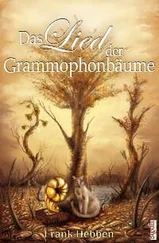Frank Tallis - Fatal Lies
Здесь есть возможность читать онлайн «Frank Tallis - Fatal Lies» весь текст электронной книги совершенно бесплатно (целиком полную версию без сокращений). В некоторых случаях можно слушать аудио, скачать через торрент в формате fb2 и присутствует краткое содержание. Жанр: Исторический детектив, на английском языке. Описание произведения, (предисловие) а так же отзывы посетителей доступны на портале библиотеки ЛибКат.
- Название:Fatal Lies
- Автор:
- Жанр:
- Год:неизвестен
- ISBN:нет данных
- Рейтинг книги:3 / 5. Голосов: 1
-
Избранное:Добавить в избранное
- Отзывы:
-
Ваша оценка:
- 60
- 1
- 2
- 3
- 4
- 5
Fatal Lies: краткое содержание, описание и аннотация
Предлагаем к чтению аннотацию, описание, краткое содержание или предисловие (зависит от того, что написал сам автор книги «Fatal Lies»). Если вы не нашли необходимую информацию о книге — напишите в комментариях, мы постараемся отыскать её.
Fatal Lies — читать онлайн бесплатно полную книгу (весь текст) целиком
Ниже представлен текст книги, разбитый по страницам. Система сохранения места последней прочитанной страницы, позволяет с удобством читать онлайн бесплатно книгу «Fatal Lies», без необходимости каждый раз заново искать на чём Вы остановились. Поставьте закладку, и сможете в любой момент перейти на страницу, на которой закончили чтение.
Интервал:
Закладка:
“What… what's happened?”
“I've been reassigned to the Saint Florian investigation.”
“Who has reassigned you?”
“Commissioner Brugel, of course.”
“But that's not-”
“Possible?” Rheinhardt smiled. “Perhaps you would be so kind as to collect Herr Kiss's photograph later this morning? I will have no further use for it.”
The look of shocked bemusement on von Bulow's face gave Rheinhardt inestimable pleasure.
On returning to his office Rheinhardt sat at his desk, where he found a note from Haussmann: Fanousek Zelenka would like to see you.
25
Steininger, Freitag, and Drexler were playing cards on the floor. They were sitting cross-legged on an old blanket that had been spread out for their comfort. The tableau they created recalled the Middle East: they might have been gamesters at a bazaar. Wolf was lying on some cushions a short distance away reading Beyond Good and Evil. They were all smoking, and the lost room was filled with gently undulating hazy veils of cigarette smoke.
“I'd like to get into the cavalry” said Steininger. “I have a cousin in the cavalry. He wears a very handsome uniform. He told me to join because you get to ride spirited horses and attract the attention of girls.”
“My father disapproves,” said Freitag.
“What? Of girls?” said Steininger, grinning.
“No, of the cavalry,” said Freitag. “He says it's corrupt. Who do you want to join, Drexler?
Freitag swigged some slivovitz from a bottle and handed it to Steininger.
“I haven't decided yet,” Drexler replied.
“You're not thinking of the civil service, are you?” said Freitag indignantly. “I can't think of anything more dull.”
Drexler looked over his spectacles. “I haven't decided yet,” he repeated calmly.
Steininger belched.
“Must you be so disgusting?” asked Wolf, without taking his eyes from his book.
Steininger shrugged, and, ignoring Wolf, said: “What about the infantry, Freitag?”
“The foot rags?” Freitag replied. “Possibly.”
Wolf tutted.
“What?” said Freitag.
“I suppose the infantry are all right,” said Wolf sarcastically. “If you want to die an utterly pointless death defending Greeks from Turks and Turks from Greeks.”
Steininger and Freitag looked puzzled.
“He's talking about Crete,” said Drexler.
“Crete?” said Steininger. “What about Crete?”
“That's where the Eighty-seventh were sent,” said Wolf. “The Christians rebelled against the Muslims, and the Greeks landed two thousand soldiers to help them overthrow the Ottoman sultan. The Eighty-seventh were sent over to separate the opponents-and they were given excellent new white uniforms so that they would be especially conspicuous in the bright sun and easy for agitators to pick off! Yes, you two join the infantry… I can't think of anything more noble, can you, than to selflessly lay down one's life for one's Greek and Turkish brothers? Your parents will be most proud.”
Steininger pushed out his lower lip. “Well, it's easy for you to criticize us, Wolf. But you haven't told us where you're going.”
“Yes, Wolf, where are you going?” Freitag repeated, the pitch of his voice raised slightly in irritation.
Wolf sighed and-still without turning to look at them-said in pointedly weary tones: “I do not intend to prance around on a horse in order to attract the attention of witless females. Nor do I intend to waste my life in some garrison town-where the only person who can read without moving his lips is the local doctor. I do not intend to meet a premature end trying to suppress some meaningless peasants’ revolt in Transylvania, and I most certainly don't intend to stand between two barbarian races hell-bent on each other's annihilation, thousands of miles away from home. No… I have other plans.”
“What plans?” asked Freitag.
“Oh, do shut up, Freitag,” said Wolf. “Can't you see that I'm trying to read?”
26
It was late afternoon when Rheinhardt arrived in Land-strasse. He had not forewarned the Zelenkas of his intention to visit; consequently, he was not surprised to find the bungalow empty. Removing a box of cigars from his coat, he passed the time puffing contentedly and contemplating the gasworks through a trail of rising smoke. Perhaps, on account of his elated state, these bleak edifices no longer looked ugly. They appeared romantic-like the dolmen tombs of mythic warriors, or the watchtowers of Valhalla.
Meta was the first to return. She immediately apologized-for no obvious reason-and ushered Rheinhardt through the door. The cramped living space was just as he remembered it: shadowy and claustrophobic. After offering him a chair, she began making tea.
“Your husband left a message-you wanted to see me?”
“Yes,” said Meta. “It's about Thomas's things.”
“Things?”
“His possessions… We received a parcel from the school, yesterday morning.” She paused, and struggled to control a sudden swell of grief that made her chest heave. “His clothes, a little money… his schoolwork and some books. But something was missing. His dictionary.”
Meta came to the table and placed a cracked cup in front of the inspector. He thanked her, and indicated that she should continue.
“It was very expensive… Hartel and Jacobsen: bound in green leather, with gold lettering. Fanousek worked very hard to get the extra money we needed. We thought Thomas should have something like that-so that he wouldn't stand out so much. We thought the other boys would have such things.”
Meta sat down opposite Rheinhardt and searched his face for a response. He felt vaguely disappointed. His expectation had been that the Zelenkas would have something interesting to tell him- something that would help him solve the mystery of their son's premature demise. The loss of the boy's dictionary however valuable the book might have been, seemed rather trivial under the circumstances.
“Are you suggesting that it has been stolen?”
Meta shrugged. “We just want it back.”
Rheinhardt nodded. “I will make some inquiries.”
“Thank you, Inspector.”
His promise to make some inquiries was hollow, disingenuous. He might ask one or two questions, he supposed, but that was all.
Rheinhardt sipped his tea.
There was nothing more to say-and the silence became increasingly brittle. Yet the inspector was reluctant to leave. He did not want to depart under a pall of disappointment, feeling that his earlier high spirits had been dissipated and that he had wasted his time.
“You said that there were other things in the parcel. May I see them?”
“Yes,” said Meta. “Everything we received is in Thomas's room. I put the clothes in the chest-the other things are on top of it.”
She gestured toward the closed door. As before, she was disinclined to follow.
Rheinhardt entered the boy's room and was struck by its terrible stillness-more so than before. He recalled sitting in his parlor, listening to Therese playing the piano and Mitzi humming, he recalled contemplating the horror of being predeceased by one's own children, and as he recalled these things, he felt as if the back of his neck was being chilled by an icy exhalation. He turned around nervously, half expecting to see the Erlkonig.
The strange presentiment passed, and Rheinhardt was visited by a sad realization. Fanousek and Meta did not want Thomas's dictionary back in order to sell it. They wanted it back because it was Thomas's-and everything that Thomas had owned was here. This was all they had left of their son.
Rheinhardt knelt by the chest and began to flick through the boy's exercise books. The margins were filled with teachers’ comments- most were helpful, but a significant number were merely sarcastic. Beneath these exercise books was a much larger volume with hard cloth covers and thick yellow paper. It contained sketches: a vase, naked bodies in various Olympian poses, and a seated woman. They were not very accomplished works of art-the athletic figures in particular were flawed by errors of proportion. However, the seated woman was executed with just enough proficiency to suggest the distinctive lineaments of Frau Becker.
Читать дальшеИнтервал:
Закладка:
Похожие книги на «Fatal Lies»
Представляем Вашему вниманию похожие книги на «Fatal Lies» списком для выбора. Мы отобрали схожую по названию и смыслу литературу в надежде предоставить читателям больше вариантов отыскать новые, интересные, ещё непрочитанные произведения.
Обсуждение, отзывы о книге «Fatal Lies» и просто собственные мнения читателей. Оставьте ваши комментарии, напишите, что Вы думаете о произведении, его смысле или главных героях. Укажите что конкретно понравилось, а что нет, и почему Вы так считаете.












